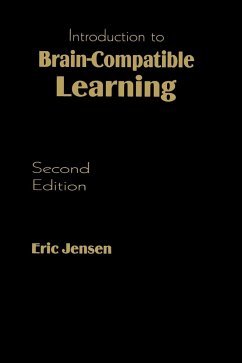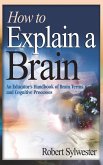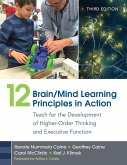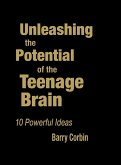Eric Jensen
Introduction to Brain-Compatible Learning
Schade – dieser Artikel ist leider ausverkauft. Sobald wir wissen, ob und wann der Artikel wieder verfügbar ist, informieren wir Sie an dieser Stelle.
Eric Jensen
Introduction to Brain-Compatible Learning
- Gebundenes Buch
- Merkliste
- Auf die Merkliste
- Bewerten Bewerten
- Teilen
- Produkt teilen
- Produkterinnerung
- Produkterinnerung
''Formerly a publication of The Brain Store This teacher-friendly resource will introduce you to the key principles of brain-compatible teaching and learning. In an easy-to-read format, this handbook demonstrates just how simple it is to improve student motivation and performance by learning how the brain works.
Covers current research on how the brain learns, and includes practical classroom applications, activities that build retention, a complete brain glossary, and examples and vignettes.
Andere Kunden interessierten sich auch für
''Formerly a publication of The Brain Store This teacher-friendly resource will introduce you to the key principles of brain-compatible teaching and learning. In an easy-to-read format, this handbook demonstrates just how simple it is to improve student motivation and performance by learning how the brain works.
Covers current research on how the brain learns, and includes practical classroom applications, activities that build retention, a complete brain glossary, and examples and vignettes.
Covers current research on how the brain learns, and includes practical classroom applications, activities that build retention, a complete brain glossary, and examples and vignettes.
Produktdetails
- Produktdetails
- Verlag: Corwin
- 2. Auflage
- Seitenzahl: 138
- Erscheinungstermin: 24. Mai 2007
- Englisch
- Abmessung: 260mm x 183mm x 12mm
- Gewicht: 469g
- ISBN-13: 9781412954075
- ISBN-10: 141295407X
- Artikelnr.: 22557334
- Herstellerkennzeichnung
- Libri GmbH
- Europaallee 1
- 36244 Bad Hersfeld
- gpsr@libri.de
- Verlag: Corwin
- 2. Auflage
- Seitenzahl: 138
- Erscheinungstermin: 24. Mai 2007
- Englisch
- Abmessung: 260mm x 183mm x 12mm
- Gewicht: 469g
- ISBN-13: 9781412954075
- ISBN-10: 141295407X
- Artikelnr.: 22557334
- Herstellerkennzeichnung
- Libri GmbH
- Europaallee 1
- 36244 Bad Hersfeld
- gpsr@libri.de
Eric Jensen is a former teacher who grew up in San Diego, California. With a Ph.D. in Human Development, he synthesizes brain research and develops practical applications for educators. He is listed among the top 30 educators in the world at GlobalGurus.org. Dr. Jensen has authored over 30 books, including Different Brains, Different Learners, Teaching with the Brain in Mind, Turnaround Tools for the Teenage Brain, Teaching with Poverty in Mind, Engaging Students with Poverty in Mind, and Poor Students Rich Students. Dr. Jensen co-founded an academic enrichment program held in 14 countries with over 75,000 graduates. He is a member of the invitation-only Society for Neuroscience and the President's Club at Salk Institute of Biological Studies. Dr. Jensen provides conference speaking and trainings that can be found at jensenlearning.com. Or, contact: eric@jensenlearning.com.
Acknowledgments About the Author Part I. Background You Need Introduction What Is Brain-Compatible Learning? The Old and New of It When Brain Research Is Applied to the Classroom, Everything Will Change Change Can Be Easy We
re Not in Kansas Anymore Where
s the Proof? Tools for Exploring the Brain Ten Reasons to Care About the Research? The Evolution of Brain Models Be a Brain-Smart Consumer: Recognizing Good Research Action or Theory: Who Wants to Read All That Research? Excellent Sources of Research Fun Factoids on the Brain What
s in the Human Brain Brain Teaser The Brain Divided The Brain Connected Brain Geography Brain "Cell"ebration: Far-out Facts About Brain Cells Learning Happens... But How? Are Today
s Kids Different? Boys
and Girls
Brain Differences Learning Disabilities: Different Brains The Cranial Soup Bowl: Understanding the Chemicals in Our Brains Part II. The Foundation for Teaching Is Principles, Not Strategies What Are the Principles? Principle 1: The Principle of Change: Brain Is Dynamic, Not Fixed Implications for Educators Principle 2: The Principle of Variety: All Brains Are Unique Implications for Educators Principle 3: The Principle of Maturation: Developmental Sensitivity Implications for Educators Principle 4: The Principle of Culture: We Have a "Social Brain" Implications for Educators Principle 5: The Principle of Connectivity: The Brain Is an Integrated "System of Systems" Implications for Educators Principle 6: The Principle of Memory Malleability Implications for Educators Principle 7: The Principle of Resource Consumption Necessity for Processing Part III. So What; Now What? Asking Big Questions: What
s in a Brain-Compatible Curriculum? Brain-Compatible Test-Taking Success Strategies Systemic Change: The Next Level Big Picture Analysis: Transformation Happens Action Research Makes a Difference The Learning Community What
s Next? Appendix A: Brain-Smart Resources and Support Appendix B: Glossary of Brain Terminology References Index
re Not in Kansas Anymore Where
s the Proof? Tools for Exploring the Brain Ten Reasons to Care About the Research? The Evolution of Brain Models Be a Brain-Smart Consumer: Recognizing Good Research Action or Theory: Who Wants to Read All That Research? Excellent Sources of Research Fun Factoids on the Brain What
s in the Human Brain Brain Teaser The Brain Divided The Brain Connected Brain Geography Brain "Cell"ebration: Far-out Facts About Brain Cells Learning Happens... But How? Are Today
s Kids Different? Boys
and Girls
Brain Differences Learning Disabilities: Different Brains The Cranial Soup Bowl: Understanding the Chemicals in Our Brains Part II. The Foundation for Teaching Is Principles, Not Strategies What Are the Principles? Principle 1: The Principle of Change: Brain Is Dynamic, Not Fixed Implications for Educators Principle 2: The Principle of Variety: All Brains Are Unique Implications for Educators Principle 3: The Principle of Maturation: Developmental Sensitivity Implications for Educators Principle 4: The Principle of Culture: We Have a "Social Brain" Implications for Educators Principle 5: The Principle of Connectivity: The Brain Is an Integrated "System of Systems" Implications for Educators Principle 6: The Principle of Memory Malleability Implications for Educators Principle 7: The Principle of Resource Consumption Necessity for Processing Part III. So What; Now What? Asking Big Questions: What
s in a Brain-Compatible Curriculum? Brain-Compatible Test-Taking Success Strategies Systemic Change: The Next Level Big Picture Analysis: Transformation Happens Action Research Makes a Difference The Learning Community What
s Next? Appendix A: Brain-Smart Resources and Support Appendix B: Glossary of Brain Terminology References Index
Acknowledgments About the Author Part I. Background You Need Introduction What Is Brain-Compatible Learning? The Old and New of It When Brain Research Is Applied to the Classroom, Everything Will Change Change Can Be Easy We
re Not in Kansas Anymore Where
s the Proof? Tools for Exploring the Brain Ten Reasons to Care About the Research? The Evolution of Brain Models Be a Brain-Smart Consumer: Recognizing Good Research Action or Theory: Who Wants to Read All That Research? Excellent Sources of Research Fun Factoids on the Brain What
s in the Human Brain Brain Teaser The Brain Divided The Brain Connected Brain Geography Brain "Cell"ebration: Far-out Facts About Brain Cells Learning Happens... But How? Are Today
s Kids Different? Boys
and Girls
Brain Differences Learning Disabilities: Different Brains The Cranial Soup Bowl: Understanding the Chemicals in Our Brains Part II. The Foundation for Teaching Is Principles, Not Strategies What Are the Principles? Principle 1: The Principle of Change: Brain Is Dynamic, Not Fixed Implications for Educators Principle 2: The Principle of Variety: All Brains Are Unique Implications for Educators Principle 3: The Principle of Maturation: Developmental Sensitivity Implications for Educators Principle 4: The Principle of Culture: We Have a "Social Brain" Implications for Educators Principle 5: The Principle of Connectivity: The Brain Is an Integrated "System of Systems" Implications for Educators Principle 6: The Principle of Memory Malleability Implications for Educators Principle 7: The Principle of Resource Consumption Necessity for Processing Part III. So What; Now What? Asking Big Questions: What
s in a Brain-Compatible Curriculum? Brain-Compatible Test-Taking Success Strategies Systemic Change: The Next Level Big Picture Analysis: Transformation Happens Action Research Makes a Difference The Learning Community What
s Next? Appendix A: Brain-Smart Resources and Support Appendix B: Glossary of Brain Terminology References Index
re Not in Kansas Anymore Where
s the Proof? Tools for Exploring the Brain Ten Reasons to Care About the Research? The Evolution of Brain Models Be a Brain-Smart Consumer: Recognizing Good Research Action or Theory: Who Wants to Read All That Research? Excellent Sources of Research Fun Factoids on the Brain What
s in the Human Brain Brain Teaser The Brain Divided The Brain Connected Brain Geography Brain "Cell"ebration: Far-out Facts About Brain Cells Learning Happens... But How? Are Today
s Kids Different? Boys
and Girls
Brain Differences Learning Disabilities: Different Brains The Cranial Soup Bowl: Understanding the Chemicals in Our Brains Part II. The Foundation for Teaching Is Principles, Not Strategies What Are the Principles? Principle 1: The Principle of Change: Brain Is Dynamic, Not Fixed Implications for Educators Principle 2: The Principle of Variety: All Brains Are Unique Implications for Educators Principle 3: The Principle of Maturation: Developmental Sensitivity Implications for Educators Principle 4: The Principle of Culture: We Have a "Social Brain" Implications for Educators Principle 5: The Principle of Connectivity: The Brain Is an Integrated "System of Systems" Implications for Educators Principle 6: The Principle of Memory Malleability Implications for Educators Principle 7: The Principle of Resource Consumption Necessity for Processing Part III. So What; Now What? Asking Big Questions: What
s in a Brain-Compatible Curriculum? Brain-Compatible Test-Taking Success Strategies Systemic Change: The Next Level Big Picture Analysis: Transformation Happens Action Research Makes a Difference The Learning Community What
s Next? Appendix A: Brain-Smart Resources and Support Appendix B: Glossary of Brain Terminology References Index







